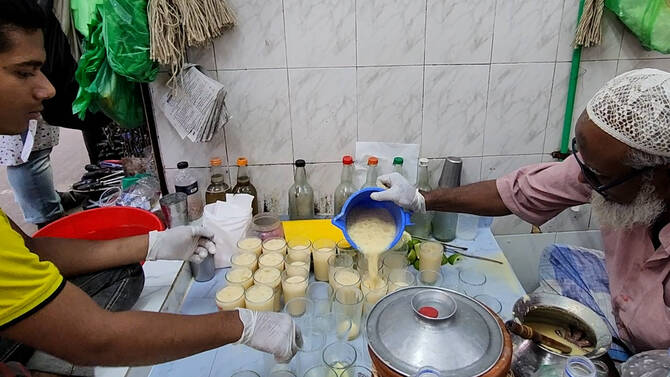DHAKA: In the streets of Old Dhaka, a shop specializing in lassi has captured people’s hearts for generations, offering a version of the flavored yogurt drink that many have deemed unique.
Since the store first opened more than a century ago, the owners of Beauty Lassi have kept to the original recipe, preserving a legendary inheritance that has withstood the test of time.
“We use yoghurt, sugar, and ice cubes to prepare our lassi. It has been carried with the same recipe from the beginning. We have been following the same methods as our grandfather did,” Mohammad Javed Hossain, 55, told Arab News.
“It’s fully natural,” he said.
“There is no adulteration here and no presence of any chemical. It’s completely chemical-free, very tasty, and mouthwatering. That’s why people like it very much.”
Tucked amid the hustle and bustle of the historic neighborhood known for its rich cultural heritage and traditional architecture, Beauty Lassi has stood as a witness to the changing tides of the Bangladeshi capital.
But as its famed lassi remained unchanged, the shop became an iconic establishment itself, beloved by old timers and a go-to spot for the younger generation.
“This business was started in 1922. My late grandfather, Abdul Aziz, launched the journey. Then my late father, Abdul Gaffar Mia, continued the business.
“Following his footsteps, now my brother Mohammad Manik and I are running the business,” Hossain said, adding that his son and nephew would continue the legacy.
Since taking over the shop about three decades ago, Hossain said he has served customers of all ages from different parts of the country and also the world.
Most people are more fond of the sweet lassi rather than the salted ones, he said.
“People from all ages visit our shop. But on average, the new generation of youths come more,” he said. “Our sales depend on the temperature (and) weather. The hotter the weather, the more business it brings for us.”
The first sip of the popular lassi has often been described as rejuvenating, a satisfying refresher in a country with a humid, tropical climate.
During Ramadan, when many people opt for the iconic flavored yogurt drinks to cap off iftar or sahoor, Dhaka residents would often make their way to Beauty Lassi for a taste of its unique flavor.
“It’s the best in the world. I tried lassi in other places too, but every time the taste of this one would come to mind. My Ramadan remains incomplete without this lassi,” Delwar Hossain, a businessman from Dhaka’s Nawabpur road, told Arab News.
“The first time I came here to have lassi … that was probably in 1981 or 1982 … Since then, I have been coming here again and again.”
Some of Hossain’s favorite memories are connected to Beauty Lassi, such as the times he visited the shop with his children, and when he took a rickshaw with his father to visit the shop over 40 years ago.
“That day, he drank three glasses of lassi. It was in 1984,” he said, adding that it was one of his last times with his old man.
“If people living in Dhaka don’t taste this drink, they can’t be considered as the residents of Dhaka.”
For many of the city’s residents, Beauty Lassi is a beacon of tradition.
“Beauty Lassi is a tradition of Old Dhaka. I grew up in this area, I have known this shop since my childhood. I am now 45 years old, and I think I have been having this drink for at least the last 35 years,” Ashiqul Islam, a teacher who lives in the neighborhood, told Arab News.
“It’s unique, I have not seen any other (lassi shop) like this. People come here for its name and fame. They bear the prestige of tradition.”
To make Beauty Lassi’s famed drink, one begins by scooping big spoonfuls of yogurt into a large bowl of water.
Next comes the syrup and a few drops of rose water, before everything is mixed by spinning a manual wooden blender. The ice cubes are last, just before the drinks are served.
This is a familiar routine for Mohammad Shahidullah, who has worked at Beauty Lassi for the past 40 years.
“Beauty lassi is a very tasty drink,” he told Arab News as he prepared a new batch for customers.
“A sip of this drink during hot summer brings much comfort.”
















